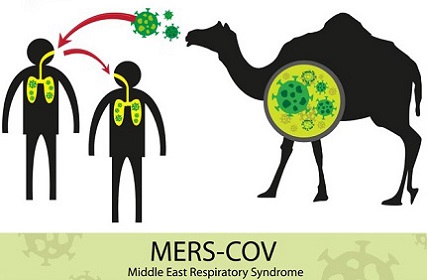Nikhil Prasad Fact checked by:Thailand Medical News Team May 14, 2024 11 months, 1 week, 5 days, 22 hours, 57 minutes ago
Medical News: Middle East Respiratory Syndrome (MERS) Coronavirus, also known as MERS-CoV or 'camel flu,' is back in the spotlight with recent cases in Saudi Arabia. In April 2024,
Medical News reports emerged about new MERS cases in Riyadh in which a few individuals were diagnosed with the virus, and one of them succumbed to the disease. This resurgence has alarmed health authorities worldwide due to the virus's high fatality rate and the potential for undetected spread.
 Recent Death And Infections By MERS Coronavirus In Saudi Arabia Raises Concerns
Details of the Cases in Saudi Arabia
Recent Death And Infections By MERS Coronavirus In Saudi Arabia Raises Concerns
Details of the Cases in Saudi Arabia
In a recent outbreak between April 10 and April 17, 2024, three men in Riyadh, Saudi Arabia, were diagnosed with MERS-CoV. The affected individuals, aged between 56 and 60, had underlying health conditions but were not healthcare workers. The first case was a 56-year-old teacher who developed symptoms such as cough, fever, and body aches before passing away. The other two men, who were staying in the same hotel and had close contact with the first patient, also tested positive and required intubation.
The Saudi health ministry reported these cases to the World Health Organization (WHO), which issued a disease alert. Investigations are ongoing to determine the source of infection, as none of the men had direct contact with camels, which are the known primary reservoir for the virus. This lack of direct contact raises concerns about potential human-to-human transmission and undetected milder infections.
https://www.who.int/emergencies/disease-outbreak-news/item/2024-DON516
Understanding MERS-CoV
MERS-CoV is a zoonotic virus, primarily transmitted from dromedary camels to humans. The virus was first identified in Saudi Arabia in 2012 and is part of the coronavirus family, which includes the common cold and Severe Acute Respiratory Syndrome (SARS). MERS is known for its severe respiratory symptoms and high fatality rate, killing approximately 36% of those it infects.
While the virus can spread between humans, such transmission is typically limited to close contacts and healthcare settings. Human-to-human transmission outside these settings is rare. However, the current outbreak's origin remains unclear, suggesting that the virus may spread through other, less obvious means.
Symptoms and Transmission
MERS-CoV symptoms range from mild respiratory issues like cough and fever to severe conditions, including respiratory failure and death. The virus spreads through respiratory fluids from infected camels, typically via direct or indirect contact with the animals or their products, such as raw milk. Human-to-human transmission occurs mainly through prolonged, unprotected contact, such as caregiving or sharing bodily fluids.
Global and Regional Risk
Since its emergence, MERS-CoV has caused 2,204
confirmed cases and 860 deaths globally, with the majority occurring in the Arabian Peninsula. The WHO maintains a moderate risk assessment for MERS-CoV, both globally and regionally, given the virus's potential for human-to-human transmission and the ongoing risk of new cases.
Pandemic Potential
Despite its high fatality rate, MERS-CoV is less transmissible than other coronaviruses, such as COVID-19. However, its ability to cause severe illness and death makes it a significant public health concern. The WHO includes MERS-CoV in its list of priority diseases, alongside the mysterious 'Disease X,' due to its potential to cause large outbreaks and the lack of specific treatments or vaccines.
Historical Outbreaks
MERS-CoV has caused several notable outbreaks since its discovery. The largest outbreak outside the Middle East occurred in South Korea in 2015, where 186 cases and 38 deaths were reported. This outbreak was traced back to a traveler from the Middle East and highlighted the virus's ability to spread in healthcare settings.
Preventative Measures
Preventing MERS-CoV involves general hygiene practices, especially for travelers to the Middle East. The NHS recommends frequent handwashing with soap and water, avoiding contact with camels, and not consuming raw or undercooked animal products. In healthcare settings, strict infection control measures are essential to prevent the virus's spread.
The Current Situation and Future Outlook
The recent outbreak in Riyadh underscores the ongoing threat posed by MERS-CoV. While the WHO and Saudi health authorities continue to investigate the source and transmission routes, the global health community must remain vigilant. Continued surveillance, rapid response to new cases, and public awareness are crucial to preventing larger outbreaks.
Conclusion
MERS-CoV remains a formidable public health challenge. The recent cases in Saudi Arabia highlight the virus's potential to cause severe illness and death, even among those with no direct contact with camels. As scientists work to understand the current outbreak and develop effective vaccines and treatments, adherence to preventive measures and robust healthcare protocols are essential to curbing the spread of this deadly virus.
For the latest updates on MERS in the Middle East, keep on logging to Thailand
Medical News.
